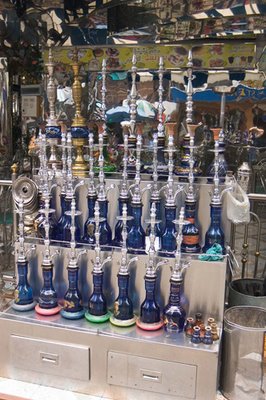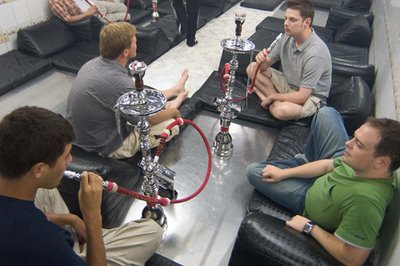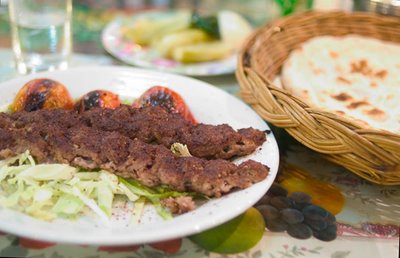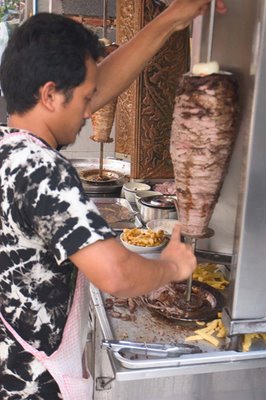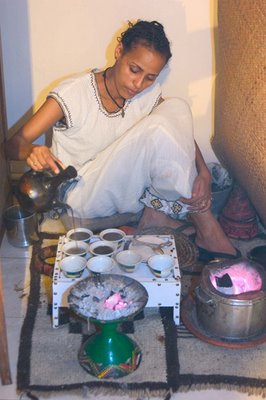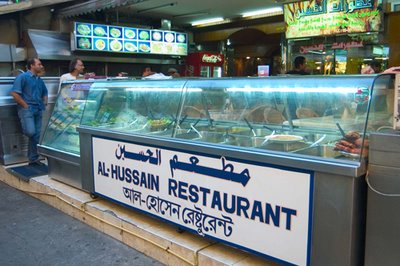ThaiDay, 08/06/06
From Iran to Bangladesh, a tour around the cuisines of Nana's Soi Arab
The songlike call to prayer emerged from a mosque across the street as I sat sipping a glass of mint-laced tea. I turned to find the source of the noise but by my view was obstructed by the fragrant smoke of several turbaned men smoking hookahs. Where am I, you may wonder? Well, not Dubai, or Damascus, or even Beirut, but rather Bangkok. Sukhumvit Soi 3/1 to be exact.
Known colloquially as Soi Arab, this street, and the area that surrounds it have long been associated with visiting Muslims. In reality, the name Soi Arab is a misnomer, as the area is home to North Africans, West Africans, Bangladeshis, Pakistanis, Persians and Malaysians, as well as Arabs, but the atmosphere is unmistakably Muslim.
And a great deal of this atmosphere is provided by the area’s lively food scene. Muslim food conjures of images of flatbreads and skewered meat, mezze and bizarre grains, and Soi Arab is no exception. A stroll around the area will reveal signs advertising a variety of restaurants serving Egyptian, Bangladeshi, Malaysian and Persian cuisine. However, despite these names, the vast majority of the restaurants serve what could only be described as ‘Pan-Muslim’ cuisine, typically incorporating elements of the better-known Lebanese and Indian styles of cooking. A restaurant claiming to have Turkish food might also have hummus on its menu, whereas a Bangladeshi restaurant may also serve a few Arab specialties. However there are a few restaurants that focus on the cuisine of a particular country, which are described in more detail below.
Nasser Elmassry Restaurant & Shishah
4/6 Sukhumvit Soi 3/1
02 253 5582
www.restaurant-shishah-nasir.com
Nasser Elmassry is one of several Egyptian restaurants in the Soi Arab are, but judging by the amount of kitschy Egyptian paraphernalia and abundance of stainless steel, appears to be the most well established. However it’s the food, rather than the ambiance, that has kept me coming back to Nasser Elmassry for years. The freshly baked pita bread (particularly the kind topped with garlic) is the best in the area, delicious when dipped into the Middle Eastern standards of hummus and baba ganoush, and hand-in-glove perfect with the Egyptian national dish, ful, pureed fava beans. As with most Muslim food, the emphasis at Nasser Elmassry is on meat, and my companions and I ordered grilled lamb chops and mutton and chicken kebabs, which served together on a vast platter, appeared substantial enough to satisfy any large carnivore. The meats were delicious and suggested every adjective associated with grilled meat: smoky, juicy and tender. One disappointing aspect of Nasser Elmassry, other than the grumpy and pushy service, is that more than 2/3 of the menu is written only in Arabic, suggesting that there’s almost certainly a great deal more on offer than the usual Middle Eastern standards.
Nasser Elmassry also features a shishah, an upstairs smoking room, where customers can recline and watch Egyptian TV programs while smoking fruit flavored tobacco from bubbling hookahs. You can also eat there if you don’t mind consuming your kebab in a haze of cherry-scented smoke.
Al-Iraqi Restaurant
8/17-18 Sukhumvit Soi 3/1
02 655 5357
Tucked into the far corner of Soi 3/1, Al-Iraqi is a restaurant that one could easily pass by without noticing it, as I did myself several times. The restaurant, as the name suggests, serves the cuisine of Iraq, a country known for many things other than its food, but the existence of a restaurant in Bangkok serving its cuisine must mean there’s something there, so I gave it a try.
Navigating the lengthy menu, I asked the staff for something typically Iraqi and was steered towards the Iraqi kebab, two skewers of minced lamb, lightly spiced and served on a bed of shredded cabbage. The meat was, I imagine, probably as good as grilled minced lamb can possibly be, and was accompanied by two colossal wheels of freshly baked bread made in a tandoor-style oven in front of the restaurant. I was only able to eat one piece of bread and was shocked to see the Iraqi man at the next table order curry and bread, as well as a heaping biryani-style rice dish, also a staple of Iraqi cooking.
Kebabs
Sukhumvit Soi 3/1, next door to Nefertiti Egyptian Restaurant
If you find the relatively high price of food in the Soi Arab area prohibitive, it will come as good news to learn that the area is also home to one of Bangkok’s best value meals: kebabs. Consumed directly on the street or at rickety tables, the kebabs sold in Soi Arab are utterly proletarian, but really are delicious, and at 50 baht, one of the best deals in Bangkok. There are three vendors selling kebabs, but the best is found at a basic restaurant adjacent to the Nefertiti Egyptian Restaurant. The kebabs here are carved from rotating spits of beef or chicken, rolled in a thin flatbread and are slathered with the requisite vegetables and sauces (as well as, oddly enough, but deeply satisfying, thick cut French fries) before being warmed in a sandwich grill. Simple, delicious and filling. And the kebab I ordered take home was just as delicious as the one I ate at the restaurant.
Abyssinya Café
16/11 Sukhumvit Soi 3
02 655 3436
www.search.in.th/abyssinya
Those in search of something more obscure than hummus or pita can do no better than Thailand’s only Ethiopian restaurant, Abyssinya Café. Located just off of Soi Arab on Sukhumvit Soi 3, this café/restaurant was started three years ago by Tigist Fekade, an Ethiopian woman who, in the words of her daughter, Frey Nebiat, was simply “looking for good coffee.” Ethiopia is the homeland of the coffee plant, and when Fekade was not able to find real Ethiopian coffee in Bangkok, she decided to circumvent the problem altogether and opened her own café serving the drink.
It didn’t take long before customers started asking for Ethiopian food, and Fekade expanded the café concept to include a variety of traditional Ethiopian dishes. Stopping by on a recent day I ordered yemisir kik wet, a vegetarian set that included stewed lentils, curried onions, a vegetable curry and an Ethiopian-style vegetable salad. My companion ordered yedoro kei watt, chicken cooked in spicy/sour berbere sauce and accompanied by homemade Ethiopian style curds and a hard-boiled egg. The dishes were served together on a large platter, the curries placed directly on top of two vast portions of injera, spongy Ethiopian-style bread. “We used to get our injera directly from Ethiopia,” explained Nebiat, of the soft, gray flatbread, “But Ethiopian Airlines stopped giving out free tickets, so now we make it here.” Along with teff, the grains used to make injera, the restaurant imports the majority of its ingredients, including the chilies and spices used to make the piquant berbere sauce, a staple of Ethiopian cooking.
The emphasis on coffee has not faded, and every Saturday and Sunday evening at 7:00 PM, Fekade brews up Ethiopian coffee beans the traditional way.
Shater Restaurant Persian Food
79/6 Sukhumvit Soi 3/1
02 655 6460
Persian is one of those cuisines I had only ever read about, so I was excited to discover that Soi 3/1 is also home to a restaurant featuring the food of Iran. I visited the restaurant recently looking forward to trying something new and exotic, but was disappointed by the menu, which seemed to feature nothing but eerily similar combinations of grilled meat and rice. Surely the people of Iran eat more than this? Nonetheless I braved forward and chose a dish highlighted as the “Webmaster’s Favorite”, the gormeh sabsi (“parsley, cilantro, chives and beans cooked with veal shank and served with basmati rice”). The dish took the form of a dark puree of the aforementioned herbs, with the random bit of bean and meat floating in the mix. The dominant taste was sour, and was not entirely unpleasant, but was entirely uninspiring. The dish and its accompanying Everest-like mound of rice seemed to be an illustration of food for sustenance. Perhaps I should have stuck with the grilled meat?
Al-Hussain Restaurant
75/7 Sukhumvit Soi 3/1
02 252 0240
Al-Hussain is located in the heart of Soi 3/1 and boasts a vast display case holding a variety of curries and brandishing a line of Bangladeshi text. Assuming the restaurant served Bangladeshi food, I asked the employees to recommend any specialties of this country. “All our foods are Bangladeshi,” said the man behind the counter, in an effort to get me to hurry up and order something. So I pointed to a chickpea curry, curried vegetables, and dhal, pureed lentils in a spicy broth, accompanied by the ubiquitous naan bread. The food was hearty and tasty—very similar to meals I’ve had in Pakistan, although I don’t think it was particularly Bangladeshi, which to my limited understanding emphasizes freshwater fish and mustard seed.
Al-Hussain features an open-air dining area, and during the course of my meal, every time a European-looking foreigner walked by, the staff had the annoying habit of screaming “Welcome saaar!” which seemed to result in making all European-looking foreigners eat everywhere but Al-Hussain.












